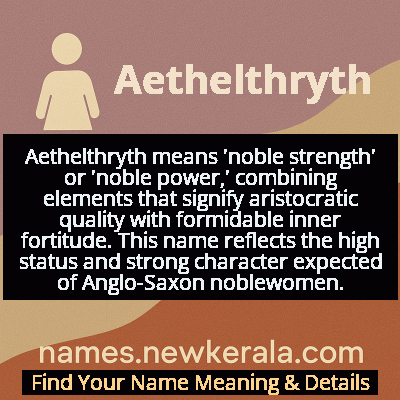Aethelthryth Name Meaning & Details
Origin, Popularity, Numerology Analysis & Name Meaning of Aethelthryth
Discover the origin, meaning, and cultural significance of the name AETHELTHRYTH. Delve into its historical roots and explore the lasting impact it has had on communities and traditions.
Name
Aethelthryth
Gender
Female
Origin
Anglo
Lucky Number
6
Meaning of the Name - Aethelthryth
Aethelthryth means 'noble strength' or 'noble power,' combining elements that signify aristocratic quality with formidable inner fortitude. This name reflects the high status and strong character expected of Anglo-Saxon noblewomen.
Aethelthryth - Complete Numerology Analysis
Your Numerology Number
Based on Pythagorean Numerology System
Ruling Planet
Venus
Positive Nature
Harmonious, responsible, caring, and artistic.
Negative Traits
Overly idealistic, superficial, possessive, or jealous.
Lucky Colours
Pink, turquoise.
Lucky Days
Friday.
Lucky Stones
Diamond, turquoise.
Harmony Numbers
2, 3, 9.
Best Suited Professions
Artists, musicians, teachers, healthcare workers.
What People Like About You
Warmth, nurturing nature, artistic flair.
Famous People Named Aethelthryth
Saint Æthelthryth of Ely
Anglo-Saxon princess, queen, and abbess
Founded Ely Abbey and maintained her vow of virginity through two marriages, becoming a revered saint
Æthelthryth of Mercia
Mercian noblewoman
Important figure in Mercian royal lineage and religious patronage
Æthelthryth of Crowland
Anglo-Saxon religious figure
Associated with monastic life and local veneration in Lincolnshire
Name Variations & International Equivalents
Click on blue names to explore their detailed meanings. Gray names with will be available soon.
Cultural & Historical Significance
The name's evolution into 'Audrey' through linguistic simplification demonstrates how medieval saints' cults influenced naming practices across centuries, while the original form preserves the aristocratic 'æthel' element common in royal Anglo-Saxon names, signifying noble lineage and the bearer's high social status. The cult of Saint Æthelthryth contributed significantly to the spread of Christianity in England and established important patterns of female monastic leadership that would influence English religious life for centuries. Her shrine at Ely became a major pilgrimage site, and the annual 'St. Audrey's Fair' gave rise to the word 'tawdry' through the cheap goods sold there, creating an unexpected linguistic legacy.
Extended Personality Analysis
Women named Aethelthryth are typically perceived as possessing strong moral conviction, resilience, and a deep sense of purpose. Historical accounts of Saint Æthelthryth suggest personality traits including determination in adhering to personal vows, spiritual devotion, and the ability to navigate complex political situations while maintaining personal integrity. The name carries connotations of aristocratic bearing combined with religious dedication, suggesting someone who balances worldly responsibilities with higher principles.
In modern interpretation, the name might imply a person of strong character who values tradition but isn't afraid to defy conventions when following their conscience. The combination of 'noble' and 'strength' in the name's meaning suggests someone with leadership qualities, dignity, and the fortitude to overcome challenges while maintaining their core values. Such individuals are often seen as principled, possibly reserved or contemplative, with an inner strength that becomes apparent in difficult circumstances. They may be perceived as having a sense of historical consciousness or connection to tradition, combined with the personal resolve to chart their own course despite external pressures.
Modern Usage & Popularity
In contemporary times, Aethelthryth is extremely rare as a given name, primarily used by families with strong Anglo-Saxon heritage interests or historical reenactment communities. The simplified form 'Audrey' remains moderately popular, while the original Old English form is almost exclusively encountered in academic or historical contexts. The name occasionally appears in genealogical research or among enthusiasts of medieval English history. Its usage reflects a growing interest in reviving authentic Anglo-Saxon names, though its complexity and unfamiliar spelling prevent widespread adoption. Modern parents choosing this name typically value historical authenticity, linguistic heritage, and the strong female archetype associated with Saint Æthelthryth, though the practical challenges of spelling and pronunciation limit its use to highly specific cultural or educational contexts.
Symbolic & Spiritual Meanings
Symbolically, Aethelthryth represents the fusion of noble lineage with spiritual strength and personal integrity. The name embodies the concept of 'noble strength' not merely as physical power but as moral fortitude and the courage to maintain one's principles against social pressure. It symbolizes the tension and potential harmony between worldly status and spiritual devotion, between political duty and personal calling. The name also carries connotations of English national identity through its deep roots in Anglo-Saxon culture and the establishment of Christianity in England. As the name that evolved into 'Audrey,' it represents linguistic transformation and cultural continuity, bridging ancient and modern English naming traditions while preserving the essence of its original meaning and historical significance. The name serves as a symbolic link to England's early medieval past and the powerful women who helped shape its religious and cultural development.

